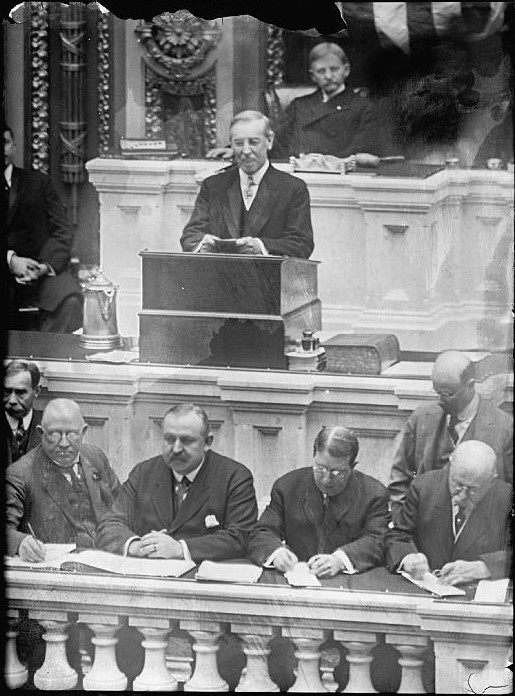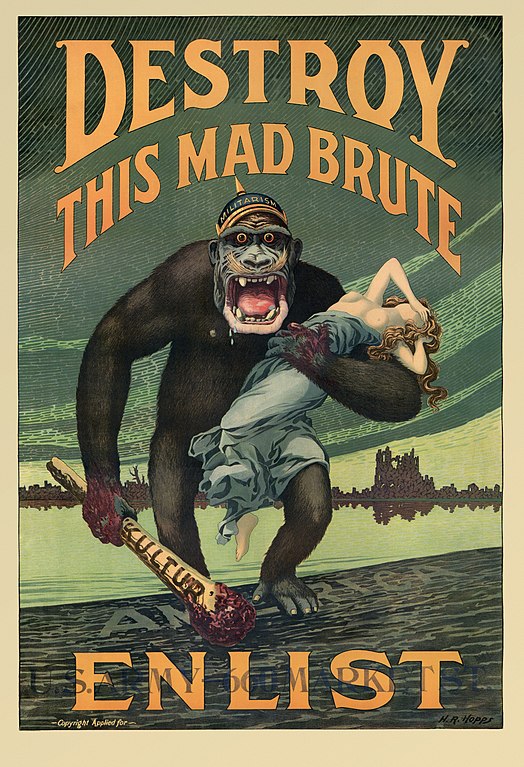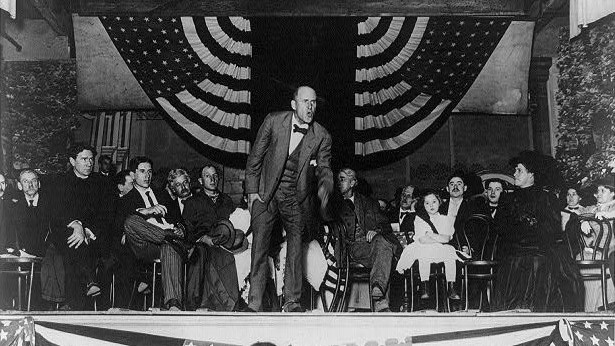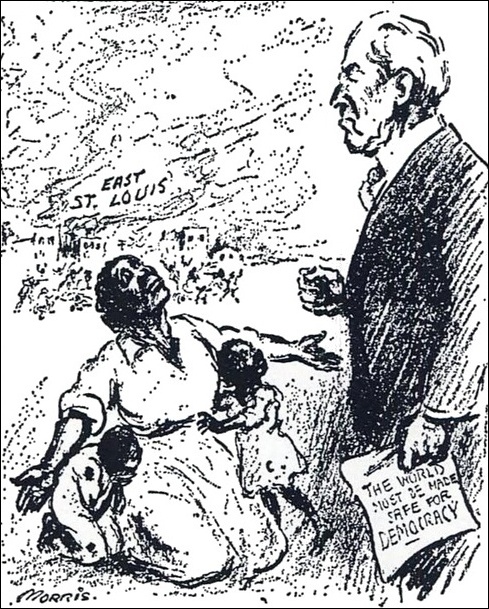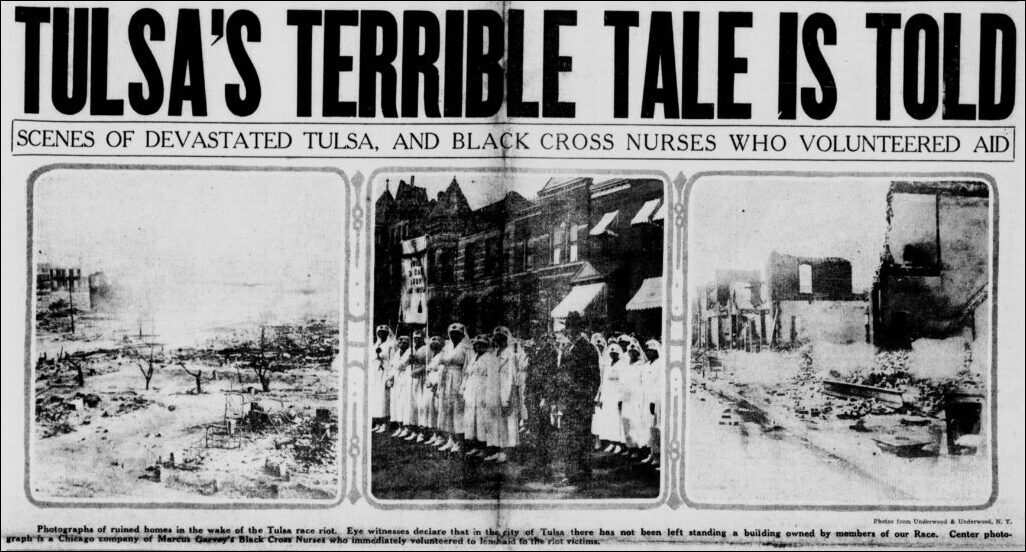Authors:
Historic Era: Era 7: The Emergence of Modern America (1890-1930)
Historic Theme:
Subject:
Winter 2023 | Volume 68, Issue 1
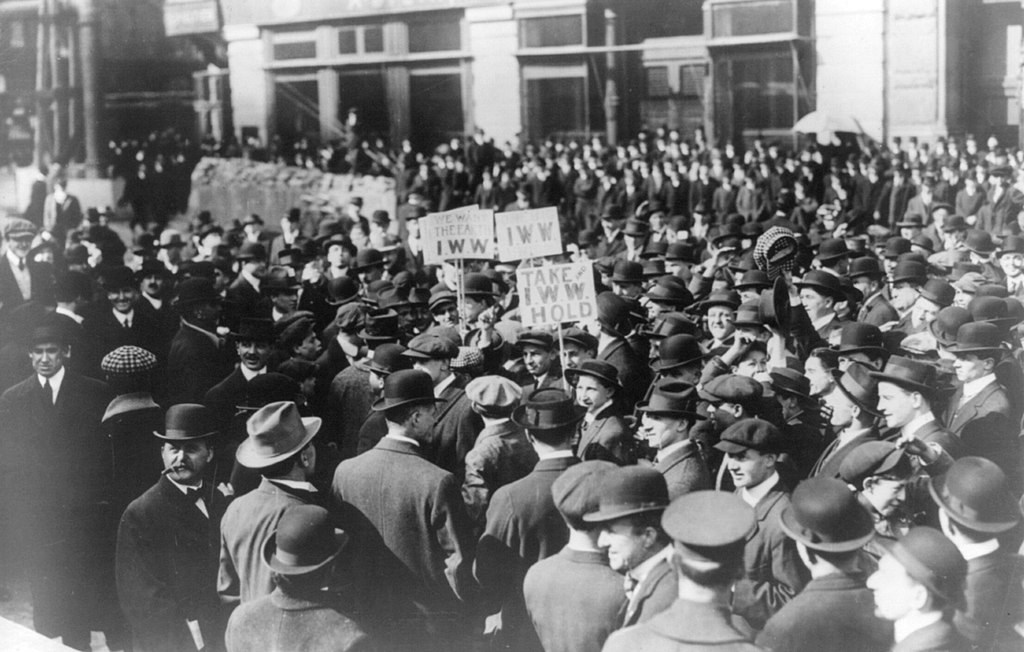
Authors: Adam Hochschild
Historic Era: Era 7: The Emergence of Modern America (1890-1930)
Historic Theme:
Subject:
Winter 2023 | Volume 68, Issue 1

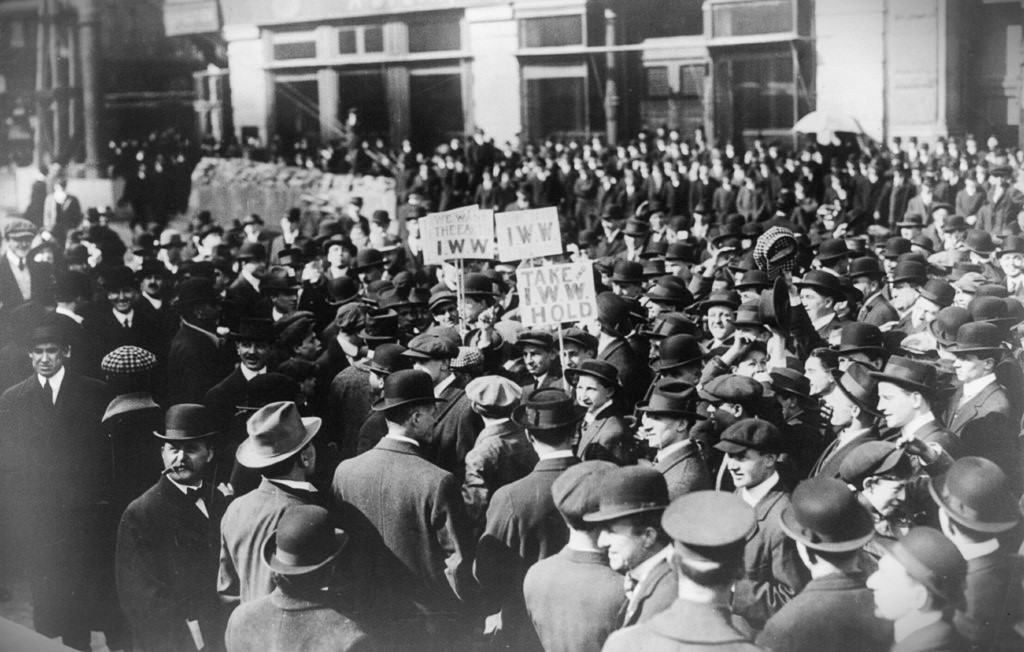
Editor’s Note: Adam Hochschild is the author of eleven books of history, memoir, and reportage, including the bestselling King Leopold's Ghost: A Story of Greed, Terror and Heroism in Colonial Africa, a richly narrated and shocking recounting of the exploitation and abuse of the Congo by King Leopold II of Belgium from 1885 to 1908. His latest book, American Midnight: The Great War, a Violent Peace, and Democracy's Forgotten Crisis, sheds light on a similarly overlooked period in history—the years between World War I and the Roaring 20s, when American democracy was threatened by battles over race, immigration, and labor. The following essay is adapted from the introduction to that book.
Night had fallen on the rugged oil-boom city of Oklahoma, when the squad of detectives appeared on a downtown street. They gathered outside a building whose ground-floor meeting hall had yellow curtains at the windows. Then they burst inside.
It was November 5, 1917, and the room they raided was the local headquarters of the Industrial Workers of the World. The IWW was the country’s most militant labor union and was organizing the region’s oil workers; for reasons obscure, its members were known to all as Wobblies. The detectives examined the premises suspiciously, looking into corners with flashlights, but found nothing more incriminating than 11 Wobblies reading or playing cards. They arrested the men, ordered them into a paddy wagon, and, for want of other offenses, charged them all with vagrancy.
The worst that the Tulsa Daily World, the voice of the state’s oil industry, could come up with the next day, looking for something damning to say about them, was, “Most of them were uncouth in appearance.”
When the Wobblies were brought to court two days later, the police could not name any laws the men had violated, and none had a criminal record. Their attorney argued that they could not possibly be vagrants, or “loafers,” as the prosecution charged, because they were employed. One had not lost a workday in ten months; another was the father of ten children and owned a mortgage-free home. However, when their trial ended late at night on November 9, Judge T. D. Evans found them all guilty and fined them $100 apiece (the equivalent of some $2,000 a hundred years later). This was a sum no Wobbly could afford and one that guaranteed that they would remain in jail.
By way of explaining his verdict, the judge cryptically declared, “These are no ordinary times.”
Immediately after he sentenced the 11 men, bailiffs seized six other men in the courtroom, five of them Wobblies who had been defense witnesses, and locked them up, as well. Shortly afterward, police ordered
Judge Evans was right: these were no ordinary times. Yet they are largely left out of the typical high school American history book. There’s always a chapter on the First World War, which tells us that the United States remained neutral in that conflict until German submarines began sinking American ships. Then, of course, we sent General Pershing and his millions of khaki-clad doughboys to Europe in their distinctive, broad-brimmed, forest-ranger hats. They fought valiantly at Château-Thierry and Belleau Wood, helped win the war, and returned home to joyful ticker-tape parades. Turn the page and the next chapter begins with the Roaring Twenties: flappers, the Charleston, Prohibition, speakeasys, and Al Capone.
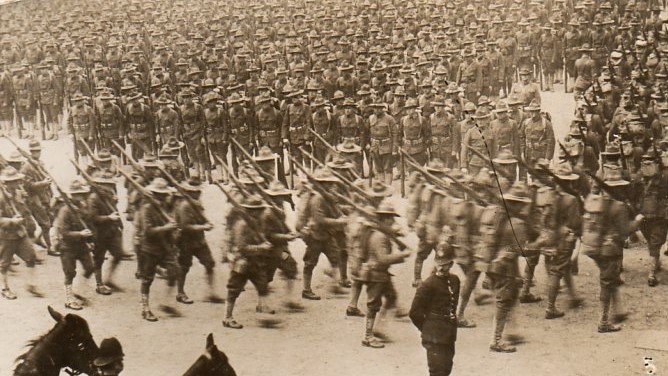
What’s missing between those two chapters is a story of mass imprisonments, torture, vigilante violence, censorship, killings of Black Americans, and far more that is not marked by commemorative plaques, museum exhibits, or Ken Burns documentaries. It is a story of how a war supposedly fought to make the world safe for democracy became the excuse for a war against democracy at home.
The toxic currents of racism, nativism, Red-baiting, and contempt for the rule of law have long flowed through American life. People of my generation have seen them erupt in McCarthyism, in the rocks and insults hurled at Black children entering previously all-white schools, and in the demagoguery of politicians like Richard Nixon, George Wallace, and Donald Trump. By the time you read this, they may well have boiled up again in additional ways. “The struggle of man against power,” wrote Milan Kundera, “is the struggle of memory against forgetting.”
Never was this raw underside of our nation’s life more revealingly on display than from 1917 to 1921. For instance, 21st-century Americans are all too familiar with rage against immigrants and talk of fortifying the southern border, but this is nothing new: major candidates for both the Republican and Democratic party presidential nominations in 1920 campaigned on promises of mass deportations.
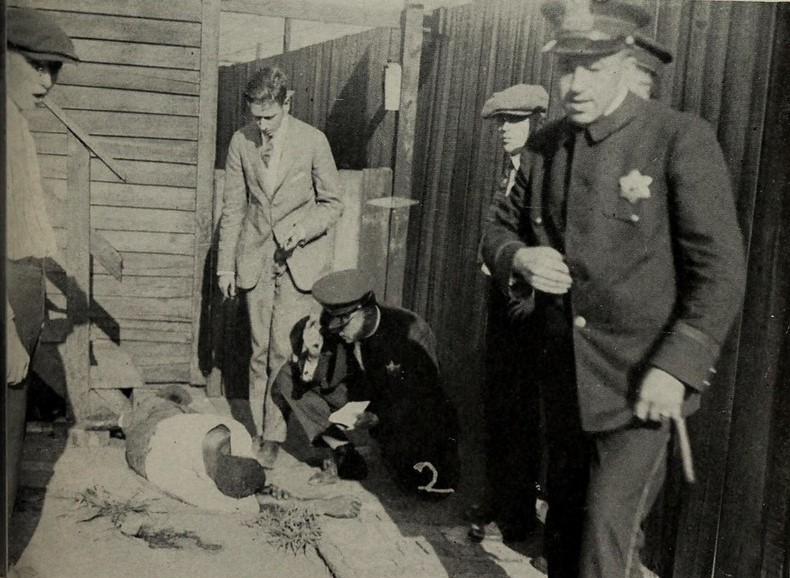
And some
During those four years, more than 450 people were imprisoned for a year or more by the federal government, and an estimated greater number were locked up by state governments, merely for what they wrote or said. For the same reason, or simply for belonging to fully legal organizations, thousands of Americans like those Tulsa Wobblies were jailed for shorter periods, anywhere from a few days to a few months.
Right-wing TV networks did not exist in 1917, but in that year was born a presidential tool even more powerful, a lavishly financed government-propaganda agency that operated in every medium of the day: films, books, posters, newspaper articles, and a corps of 75,000 speakers who gave more than seven million talks everywhere, from movie houses to revival tents. In addition, the federal government attacked the press, both during and well after the First World War. It banned hundreds of issues of American newspapers and magazines from the mail (a fatal blow in an age before electronic media), permanently barring some 75 periodicals entirely.
These years also saw the birth of a nationwide group of vigilantes that, in size and power, dwarfed the militia groups in bulletproof vests that would flourish a century later. With more than a quarter million members, the American Protective League became an official auxiliary of the Department of Justice. Men in its ranks would sport badges and military-style titles, cracking heads, roughing up protestors, and carrying out mass arrests. Tens of thousands of Americans would join smaller local groups, as well; the masked vigilantes under those black hoods in Tulsa that night in November 1917 belonged to one called the Knights of Liberty.
When the police cars stopped at the railroad crossing, “none of the policemen had a chance to reach for his gun,” claimed the Tulsa Daily World, “as they were surrounded by armed men.” The World’s managing editor, who clearly had been tipped off beforehand, was on the scene to observe, even bringing his wife with him. The newspaper had virtually called for something to happen, publishing an editorial that very afternoon saying, “The first step in the whipping of Germany is to strangle the I. W. W.’s. Kill ’em, just as you would kill any other kind of a snake. . . . It is no time to waste money on trials and continuances and things like that. All

The masked, robed members of the Knights of Liberty tied the hands of each Wobbly with rope, climbed into the police cars themselves, and ordered the drivers on, accompanied by additional carloads of black-clad men. By a ravine in the Osage Hills just outside town, the cars parked in a circle, their headlights shining on an oak tree. A bonfire crackled and flickered into the night sky.
The vigilantes stripped the Wobblies to the waist and made them remove their shoes. Then, one by one, they marched each man at gunpoint to the tree, tied him to it, and whipped him until his back bled. The lashing, according to one eyewitness, was done with double pieces of heavy rope soaked in saltwater; according to another, with a “black snake”—a long leather whip weighted with shot.
Then the vigilantes produced a pot of hot tar. As they brushed it onto each Wobbly’s chest and bleeding back, from beneath his hood, the group’s leader intoned, “In the name of the outraged women and children of Belgium.” (German atrocities there were a centerpiece of American war propaganda.) The mob next slit open pillows and rubbed handfuls of feathers onto the tar.
One member poured gasoline over a pile of shoes and clothing taken from the Wobblies, which contained their watches, pocketknives, money, and “everything that we owned in the world,” in the words of one victim, and set it on fire. Finally, the Knights of Liberty told the barefoot Wobblies to run for it. To the accompaniment of volley after volley of rifle and pistol shots fired over their heads, they scattered into the frigid darkness.
Federal agents, the World reported the next day, “were making no apparent effort to discover the identity of the fifty black-robed and hooded men who held up the police cars . . . and had received no instruction from Washington as to what steps should be taken.” These Wobblies survived, but many other victims of this grim period would not. On a barbed-wire fence near the ravine, in the path of their flight, the newspaper reported, “pieces of clothing and flesh, and a profusion of feathers, were found entangled.”
Although this brutal time unfolded long before I was born, both my parents lived through it. They experienced it differently. To my mother, the daughter of a Princeton professor, Woodrow Wilson had been a familiar figure long before he was first elected president in 1912. His solemn gray eyes behind a pince-nez, a neatly folded handkerchief in his breast pocket, he doffed his top hat to women he met as he walked to work each day on the placid, leafy streets near her home. Wilson had been the university’s president until he was elected governor of New Jersey in 1910 and continued to live in Princeton until voters sent him to the White House two years later. When a bell in a campus tower pealing nonstop proclaimed that news, my grandparents took their young daughters over to the Wilsons’ spacious half-timbered Tudor house to join those who came to congratulate the couple. A few years later, my 16-year-old mother shared the enthusiasm that swept the country as it entered the First World War, determined to defeat Kaiser Wilhelm II, that symbol of German militarism with his upswept mustache and love of bemedaled uniforms. She and her sisters rolled bandages for the Red Cross and moved pins on a map of Europe to show the positions of the armies. They were thrilled to see the flags of all the Allied nations hanging in the Princeton gymnasium, as well as the student cadets in puttees drilling on campus or donning leather helmets and goggles at a new nearby airfield. When a delegation of British officers visited town, hostesses vied to entertain them. Only after the war’s end did my horrified mother learn that it had claimed the lives of two beloved male cousins. For my 24-year-old father, the war brought no cheering. Although his family was well-off, they lived in fear. His parents were Jewish, his father an immigrant from Germany and his mother the daughter of immigrants, and the family spoke German at home. But you risked being beaten up if someone heard you doing so on the street, for patriots now condemned the “kaiser’s tongue.” In New York City, where they lived, the Metropolitan Opera announced that it would cease performing works in German. The American Defense Society, whose honorary head was ex-president Theodore Roosevelt, declared, “The sound of the German language . . . reminds us of the murder of a million helpless old men, unarmed men, women and children . . . the ravishment and murder of young girls.” One wartime Sunday, spreading across five columns of the New York Times, which my father and grandfather read faithfully, was an article by a Johns Hopkins professor under the headline “Educator Says It Is a Barbarous Tongue.” A few weeks later
In Shawnee, Oklahoma, a crowd burned German books to mark the Fourth of July. At least 19 ceremonial bonfires of such books were lit in Ohio alone; the public library in Columbus sold its German books for scrap paper. In McLean County, Illinois, a crowd of 300 surrounded the Evangelical German Lutheran Church and demanded that it cease using German or they would burn down the building. A Justice Department official on the scene ordered the church to comply. North Dakota, Delaware, Montana, and Louisiana banned the teaching of German in school. Iowa and Nebraska banned the use in public of all foreign languages. “This is a nation,” Theodore Roosevelt thundered, “not a polyglot boarding house.” Organizations rushed to change their names: the German Savings Bank of Brooklyn, for instance, became the Lincoln Savings Bank. The Lenox Hill Hospital of my own New York City childhood, across the street from my pediatrician’s office, had previously been the German Hospital and Dispensary, with a Kaiser Wilhelm Pavilion. “It is the Christian duty of Americans,” a Methodist minister declared, “to decorate convenient lamp posts with German spies and agents of the Kaiser, native or foreign-born.” A Minnesota pastor was tarred and feathered because people overheard him praying in German with a dying woman. One of many patriotic lecturers touring the country with lurid tales of atrocities, a Congregational minister from Brooklyn told his audiences that Germans were so inherently brutal that, after the war, ten million of their men should be sterilized. Hysteria against Germans blended seamlessly with long-standing anti-Semitism. America barred Jews, either explicitly or in practice, from many clubs, businesses, law firms, college faculties, hotels, and more. The novelist Henry James was disgusted by the Jews he saw “swarming” on New York’s Lower East Side, reminding him of “small, strange animals . . . snakes or worms . . . who, when cut into pieces, wriggle away contentedly and live in the snippet as completely as in the whole.” In 1913, on evidence that’s today considered fraudulent, Leo Frank, a young New York Jew working in Atlanta, had been convicted of raping and murdering a 13-year-old girl. Two years later, in the middle of the night, a mob broke into a prison, seized him, and lynched him. Half the 3,000 Jews living in Georgia left the state. New York was not the Deep South, but as a family with a name both German and Jewish, we still felt vulnerable. Several of my father’s cousins would before long legally change their last name to one that sounded Anglo. On all sides were
Popular songs reflected the vengeful mood: Most Americans—almost certainly including my mother—were unaware of the violence underlying this feeling. If it mentioned them at all, the press often portrayed vigilantes beating up pacifists as patriots who were subduing rowdy malcontents. If the government banned an issue of a newspaper or magazine, or shut it down entirely, this was seldom announced. And no one was reporting from the prison at Camp Funston, Kansas, where conscientious objectors to military service were shackled to their cell bars on tiptoe for eight hours a day. Most Americans were also unaware that hundreds of private detectives, undercover agents from the Bureau of Investigation (the predecessor to the FBI), and hundreds more agents from Military Intelligence were in the audiences for political meetings and were infiltrating perfectly legal organizations. In Tulsa, for example, the police seized those 11 Wobblies in their office and arrested six more sympathizers in the courtroom, for a total of 17. But when it came time to whip, tar, and feather them, there were only 16 victims. The 17th, a 29-year-old whose alias was John McCurry, was whisked out of his holding cell on a pretext because he had been working undercover for the Pinkerton National Detective Agency. Pinkerton’s wide range of corporate clients included Oklahoma’s oil interests. Such spying has a long history. I had my own brush with it as an opponent of the Vietnam War in the late 1960s and early 1970s. Although I was a most insignificant figure in that movement, when I later used the Freedom of Information Act to get the heavily redacted files on me compiled by the FBI, the CIA, and the army, I received more than 100 pages. Ever since, when writing history, I’ve been drawn to surveillance records. They often tell you, inadvertently, more about the minds of
Until 1917, surveillance in this country had been almost entirely the work of private detectives. Despite thousands of films and novels to the contrary, such detectives were not hard-boiled private eyes with hearts of gold who rescued kidnapped heiresses and solved other mysterious crimes. Rather, like that Pinkerton man in Tulsa, they were frontline troops in the long war that American business waged on labor. But the paranoia ignited by the First World War empowered government intelligence agencies, both military and civilian, to do their own spying and infiltrating. Such surveillance remains part of American life to this day. Although the government first used the war in Europe to justify the ferocity at home, the repression continued, and in some ways, grew worse, in the several years after the fighting ended, a time known as the Red Scare. Deep tensions fueled it. During the very days those Tulsa Wobblies were in jail, a group of radical Marxists known as Bolsheviks seized power in Russia, and many American business and political leaders feared that the Russian Revolution might spread to the United States. Other forces also fed the violence, and most of them are still with us: a long-simmering nativism and hatred of immigrants; a military that had picked up brutal habits waging war on guerrillas in Asia; the bitter conflict between big business and organized labor that had raged for decades; and, finally, a nostalgia among white southerners—and many northerners—for the days when Blacks “knew their place.” Between 1917 and 1921, there was also, to be sure, some violence from the left. Workers attacked strikebreakers with fists, knives, and bricks. Anarchists planted bombs, killing several dozen people. For many other acts of violence, however, it is unclear who was responsible. The very afternoon before those Wobblies were arrested, for example, a 300-foot railroad bridge not far from Tulsa caught fire. The cause of the flames “has not been discovered,” reported the Tulsa Democrat, “but it is thought to have been a part of an I. W. W. plot.” The paper cited no evidence, however, and in this period, no prosecutor ever convicted an Oklahoma Wobbly of an act of political violence. The greatest ferocity by far came from federal and state governments, businesses, and the vigilantes allied with them—and it was backed at the very highest level. The corporate lawyer Elihu Root was a former Secretary of War, Secretary of State, and senator from New York. In August 1917, he had just returned from a trip
Such fierceness echoed across the country. Who, for instance, led the mob that tarred and feathered those Tulsa Wobblies? Two men: the city’s police chief, Ed Lucas, and W. Tate Brady, one of its most prominent business figures. Brady’s holdings included a lumberyard, a coal mine, commercial real estate, and the first hotel in town with baths. The IWW office, in fact, was on West Brady Street. Just a few days before the arrests, the volatile Brady, no stranger to the use of force, had attacked and beaten up a rival property owner who had rented that space to the IWW. The son of a Confederate veteran, Brady had moved to Oklahoma when white settlers were still staking out land in what was then Indian Territory. Later, he would join the Ku Klux Klan and, with his business profits, build a mansion modeled on the Virginia home of the Confederate general Robert E. Lee. As the Red Scare subsided, a warning of a more brutal sort was given to Black Americans who had hoped for a better life by leaving the Deep South. The Wilson administration had done virtually nothing to prosecute members of the white mobs who killed hundreds in the “Red Summer” of 1919, and such stark impunity bred more violence. One of the most horrific outbreaks came two years later in Tulsa, Oklahoma. This was the same city where, in 1917, those 16 Wobblies had been whipped, tarred, and feathered. What unfolded now, however, was infinitely worse. The fateful chain of events began on May 30, 1921, with a rumor, probably spurious, that a Black man had threatened a white woman in an office building’s elevator. Street fighting broke out and a white man was killed. Over the following two days, white mobs, including many veterans, roamed the city’s streets, looting Black homes and businesses. They set scores of buildings on fire, sometimes from the top down by taking to the air in small planes to drop homemade incendiary bombs. Signs of Black economic success have often provoked white resentment, and Tulsa had an unusually large Black business district, sometimes called Black Wall Street, that included shops, restaurants, hotels, and lawyers’ and doctors’ offices. More than 1,400 businesses and homes covering 35 blocks were left in charred, smoking ruins. A photograph W. E. B. Du Bois published in The Crisis
Two weeks after what he called “the late negro uprising,” Tulsa’s mayor announced that “everything is quiet in our city . . . This menace has been fully conquered.” He promoted a plan for turning parts of the ruins into an industrial park and new railway terminal, to separate white and Black Tulsa. Blacks burned out of their homes would be allowed to rebuild “farther north and east.” Zoning regulations were changed accordingly. That mayor, incidentally, was T. D. Evans, the same man who, as a judge four years earlier, had found the arrested Wobblies guilty because “these are no ordinary times.” Meanwhile, not just in the South, but across the country, crosses flamed in the night as the Ku Klux Klan enjoyed a resurgence, reaching an estimated four million members by 1924. Many Klansmen, including the leading strategist of the group’s rebirth, Imperial Wizard William Simmons, were former members of the American Protective League. On Memorial Day in 1927, a march of some 1,000 Klansmen through the New York City borough of Queens turned into a brawl with the police. Several people wearing Klan hoods were arrested, one of them a young real estate developer named Fred Trump. Ninety years later, his son, with similar feelings about people of color, would enter the White House. During Donald Trump’s presidency, the forces that had blighted the America of a century earlier would be dramatically visible yet again: rage against immigrants and refugees, racism, Red-baiting, fear of subversive ideas in schools, and much more. And, of course, behind all of them is the appeal of simple solutions: deport aliens, forbid critical journalism, lock people up, blame everything on those of a different color or religion. All those impulses have long been with us. Other presidents, both Republican and Democrat, have made dog-whistle appeals on the issue of race. Vigilante superpatriots, sometimes violent, have cropped up again and again since the American Protective League prowled the streets looking for draft dodgers. Just as veterans of the Philippine War appeared in the political violence that surged after 1917, so veterans of later Asian
Although the long battle between business and organized labor rarely again would become as violent as it was more than a century ago, it has not disappeared. With smooth-talking, social-media-savvy “union-avoidance” consultants replacing National Guard troops and private detectives, that struggle continues to the present day. America’s version of democracy is far from perfect, and every generation or two, we learn anew just how fragile it can be. Almost all the tensions that roiled the country during and after the First World War still linger today. It may be a sudden event that kindles them into flame, as did the nation’s entry into that war, followed by the Russian Revolution, or it may be gradually mounting pressures. Some of those pressures are already here, such as the increasingly northward flow of refugees fleeing global warming. To keep these dark forces from overwhelming American society once again will require a lot from us. Knowledge of our history, for one thing, so we can better see the danger signals and the first drumbeats of demagoguery. Brave men and women both inside and outside the government, like those who spoke the truth and stuck to their principles more than a hundred years ago. A more equitable distribution of wealth, so that there will not be tens of millions of people economically losing ground and looking for scapegoats to blame. A mass media far less craven to those in power than it was from 1917–21. And, above all, a vigilant respect for civil rights and constitutional safeguards, to save ourselves from ever slipping back into the darkness again. From AMERICAN MIDNIGHT: The Great War, a Violent Peace, and Democracy’s Forgotten Crisis by Adam Hochschild. Copyright © 2022 by Adam Hochschild. Reprinted by permission of Mariner Books, an imprint of HarperCollins Publishers.